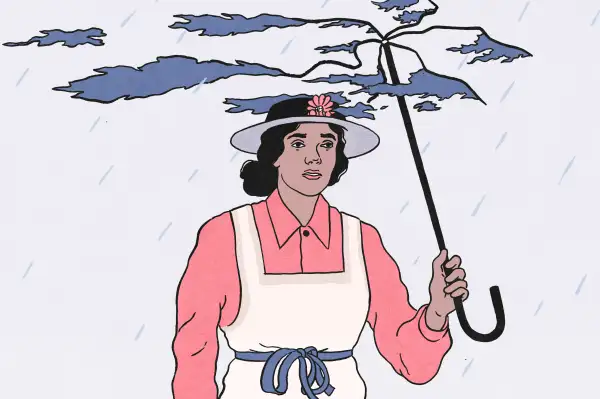Coronavirus Is Forcing Domestic Workers to Choose: Protect Their Health or Pay Their Bills?

When Emily Norde showed up for her nannying job in early March with her 10-month-old daughter in tow, she expected it to be a normal day of work. And it was, until the parents returned home that evening.
“The mom had been running a fever of 103 degrees since that morning. Meanwhile, my daughter and I had been in their home all day and they didn’t say anything until we were leaving,” says Norde.
Norde's daughter has a heart murmur, and Norde herself has been in and out of doctor's offices for more than a decade due to a presumed autoimmune disorder that causes hives, flu-like symptoms, and joint aches. The mother did not end up having COVID-19 as suspected, but Norde was still hurt that she'd been kept in the dark, considering her and her daughter's immunocompromised statuses. What if someone in the family did get the coronavirus? How would she keep her own family safe?
Both of the parents Norde worked for are considered "essential employees," (a police officer and a veterinarian) so even after the governor of Washington state—where she's based— announced a statewide stay-at-home order, she knew they would continue to need childcare. If she stayed, she would be compromising her and her daughter’s health; if she quit, she would lose her income and leave the family in a desperate time. Ultimately, Norde and her husband decided she should leave.
Norde doesn’t qualify for unemployment benefits since her autoimmune disorder is still undiagnosed. So until the pandemic is over, the family has to rely on her husband’s income as a city maintenance worker.
She's one of about 2 million domestic workers in the U.S. who work as in-home childcare, housekeeping, and nursing providers —and whose livelihoods have been thrown into shambles as families return to their homes and lay them off, or, in cases like Norde's, ask them to choose between their health and financial stability.
Many in-home caregivers have rapidly lost most of their income, with more than 55% of workers reporting that they could not make rent in April, according to an April 8 study from the Economic Policy Institute and the National Domestic Workers Alliance.
While the stimulus bill did broaden eligibility for unemployment benefits, and created financial assistance for workers performing gig jobs, it requires recipients to provide a social security number or income tax returns. This enormous blind spot makes domestic work, a sector dominated by under-the-table payments, particularly vulnerable right now.
“The bureaucracy has created unnecessary barriers that prevent people from getting the help they need,” says Julia Wolfe, an economic analyst for the Economic Policy Institute. “The human cost of not including domestic workers in federal relief will be devastating.”
There's a prevailing myth that nanny work is more of a hobby than a career — something neighborhood girls do on weekend nights to pass the time — but the reality is a lot more nuanced.
The median age for domestic workers is 45, about four years older than other occupations, according to the Economic Policy Institute. It's a field that tends to employ a lot of women, millions of whom are women of color, and the primary breadwinners in their families. Numerous studies have shown that these lower-wage “pink collar” jobs tend to be less flexible, have less benefits like retirement plans, and pay less than other male-dominated industries like construction and manufacturing.
Rather than having a typical 40-hour week, these workers often take on multiple part-time jobs per week which add up to a full-time (if not more) workload. One in five are non-citizen green card holders or undocumented residents, so it can be hard, if not downright impossible, for them to provide proof of unemployment (even having an Individual Tax Identification Number, which many pay taxes through, doesn't make them eligible for benefits).
With the economy at a standstill, the National Domestic Workers Alliance and the Economic Policy Institute are pushing for future stimulus bills to be more expansive — and to provide financial assistance to workers without social security numbers or tax returns.
Online platforms like UrbanSitter and SitterCity help match available caretakers to parents, but sitters are still employed on an independent basis, so they don't make securing proof of unemployment any easier.
And for people like Diamond Knights, things are already going downhill fast.
Knights lives in New York, and provides part-time childcare to stay afloat, along with official contracted agency work as a newborn care specialist. She splits her time between two families — one of which is holding off all pay for the foreseeable future.
"I have to replace that income, but this is the most dead I've ever seen job boards," she says.
The stimulus check Knights is set to receive will provide at least some temporary help, but she's worried about the future. If the pandemic continues into the summer, she doesn't know how she'll be able to pay rent.
Still, things could be worse. The other family Knights nannies for has agreed to keep paying her despite not having her in their home. For that, Knights considers herself "one of the lucky ones." She's spoken to countless sitters who say they aren't making any money right now.
“A lot of people are starting to realize that just because you’re close with the family, doesn’t mean they won’t lay you off when push comes to shove," she says. “I’ll definitely be asking future families how they treated their previous nannies during this situation."
More from Money:
Coronavirus and Charity: How Can I Make the Most Impact with My (Kinda Small) Donation?
